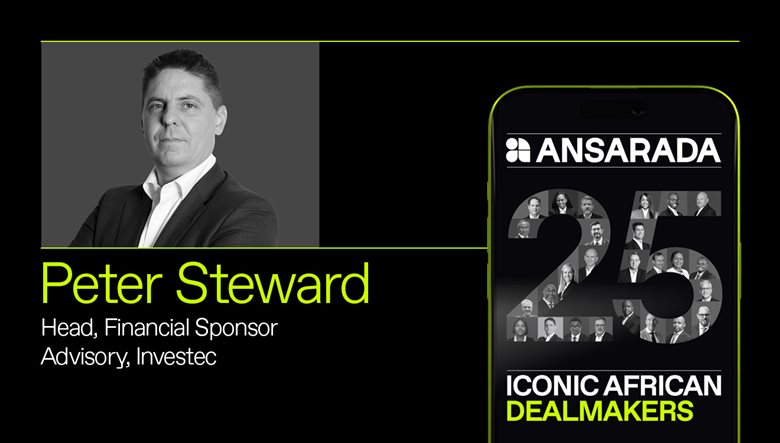From founder-led exits to PE resurgence: 25 years of M&A insights from Investec's Peter Steward
Peter Steward of Investec Corporate Finance reveals the evolving dynamics of South African M&A, from high-stakes founder exits to the return of international capital.
By AnsaradaMon Sep 01 2025Industry news and trends, Innovation, Tenders

In the fast-paced world of mergers and acquisitions, few professionals have witnessed as much transformation as Peter Steward, Head of Financial Sponsor Advisory at Investec Corporate Finance. With 25 years of experience navigating everything from founder-led exits to complex private equity transactions, Peter has seen South Africa's M&A landscape evolve through regulatory changes, market volatility, and the recent resurgence of international interest.
From advising entrepreneurs on deeply personal business sales to witnessing the return of large buyout funds after a decade-long absence, his insights in our 25 Iconic DealMakers Report reveal both the human and financial complexities that drive today's dealmaking environment.
What initially attracted you to corporate finance and investment banking?
Coming through the ranks and completing my articles, I was drawn to the steep learning curve, the diverse skill set, and the well-rounded experience that a career in corporate finance offers. The continuous learning and ever-evolving nature of the industry keep it engaging and dynamic.
Was there a defining moment or transaction that cemented your passion for M&A?
One of the most pivotal experiences in my career was advising on the Long4Life transaction when Old Mutual acquired it. Working closely with Brian Joffe and his team was both an honour and an intense learning experience. The deal was complex and fast-paced, requiring high-pressure decision-making.
Even with significant prior experience, this transaction reinforced the depth of knowledge and adaptability required in the field.Every dealmaker encounters transactions that test their skills.
Can you share a deal that was particularly challenging and the key lessons you learned from it?
Rather than a single deal, I find that transactions involving founder-led businesses are often the most demanding. Entrepreneurs and business founders have built their companies from the ground up, making these transactions deeply personal. Deals such as those involving Sequence Logistics disposal to AIIM and Chill Beverages disposal to Long4life required a heightened level of sensitivity and strategic negotiation.
In these cases, the pressure is significantly higher, as founders are not just selling a business—they are parting with something they have spent years cultivating.
The key takeaway is to approach such transactions with a deep understanding of their perspective and ensure that they feel confident in the process. Given the nature of due diligence, advisors often have to deliver difficult news.
Have you ever had to advise a client against proceeding with a deal?
Yes, this is a common occurrence. Integrity and professionalism are fundamental in corporate finance, and our role is to provide objective, well-considered advice. Our priority is to ensure that clients receive the best possible guidance, even if it means advising against a deal that does not align with their long-term interests.
Transactions must be approached with a long-term advisory perspective rather than short-term gains. This means being honest when due diligence uncovers issues that could materially impact valuation or the feasibility of a deal. Clients appreciate an advisory relationship built on trust, knowing that our focus is on their sustained success.
Beyond shareholder value, how do you see M&A shaping South Africa’s broader economic landscape, particularly in terms of employment and socio‑economic impact?
South Africa presents significant opportunities, particularly among mid-sized, entrepreneur-led businesses. Many of these companies operate under the radar but are highly successful. The ability of private capital to support their growth not only expands business opportunities but also drives employment and economic activity.
A key challenge is ensuring that these entrepreneurs remain in South Africa and continue to contribute to the local economy. Retaining entrepreneurial talent and fostering an environment where they feel encouraged to invest further is essential.
One client recently remarked that our success is built on a foundation of South Africans who lack access to similar opportunities, underscoring the broader responsibility to create inclusive economic growth.
Do you believe South Africa’s regulatory landscape is supportive or restrictive in retaining and fostering entrepreneurial growth?
Historically, regulatory constraints—such as exchange controls—have created uncertainty, prompting many entrepreneurs to consider moving capital offshore. A key priority should be reducing volatility and fostering an environment that encourages long-term local investment.
When entrepreneurs feel confident that the economic and regulatory framework is stable, they are more likely to reinvest in their businesses rather than seek exit strategies. Predictability and policy consistency are crucial in maintaining investor and business confidence.
Over the past 25 years, what have been the most significant shifts shaping South Africa’s M&A landscape?
One of the biggest changes has been the decline of large buyout funds over the past decade, which left a capital gap in the market. In response, private equity firms have turned their focus to mid-market opportunities. More recently, we are seeing international funds once again considering Africa, and large African funds are increasing their interest in South Africa.
Additionally, local private equity firms are raising more capital, which signals renewed confidence in the market. This gradual return of large private equity buyout funds is reshaping the landscape and creating fresh opportunities for dealmaking. The SAVCA survey last year indicated that fundraising reached a 13‑year high.
Where do you see the biggest opportunities in M&A, and are there any notable shifts in deal structuring?
Given the challenging economic conditions of recent years, many private equity funds have been patient with their exit strategies. However, with improving market conditions, we anticipate an increase in disposal processes this year. Currently, earnings momentum does not yet align with overall market sentiment. As a result, deal structures incorporating earnouts and contingent payments are likely to become more prevalent. As market fundamentals improve, we may see a shift from a buyer’s market to a more balanced landscape.
Due diligence plays a critical role in mitigating risk. Have you observed any notable changes in how due diligence processes are conducted?
Transactions are becoming increasingly complex, leading to longer due diligence timelines. One key trend is the distinction between vendor due diligence and buyerdriven due diligence, with additional top-up due diligence required at various stages. This extends transaction timelines and increases costs, making process efficiency an important focus area.
Finally, what advice would you offer to young professionals aspiring to build a career in investment banking and corporate finance?
Patience is key. It is important to gain exposure to as many transactions as possible, learning from each one. Corporate finance is a field that rewards experience, and developing expertise takes time. A strong foundation, built on handson involvement in diverse transactions, is essential for long-term success.


